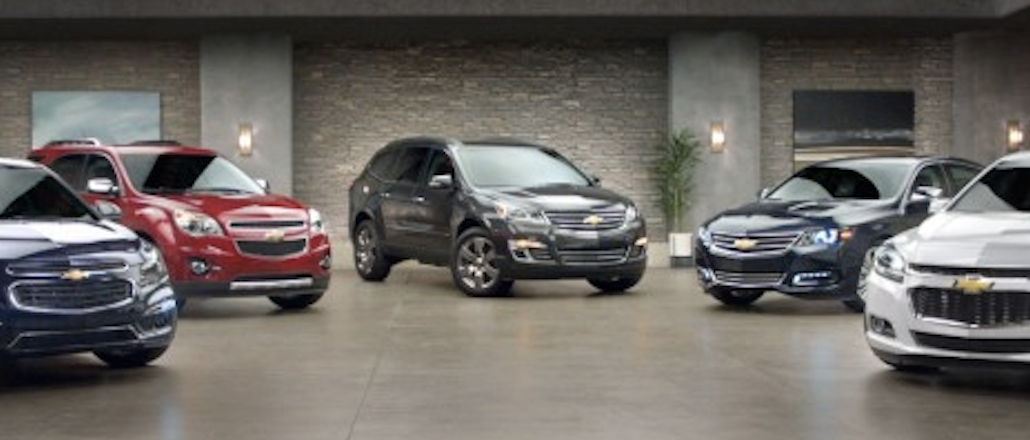Secure your place at the Digiday Publishing Summit in Vail, March 23-25

For most people April Fool’s Day ranks among the worst “holidays” — it’s tedious at best, obnoxious at worst. Not content to go the prank route, Chevrolet’s new “Real People, No Actors” campaign kicked off on April 1 with what it called #BestDayEver.
The automaker toured cities across America on Wednesday, doling out a range of treats. Some lucky fans got to see Kelly Clarkson live, while another woman was given a makeover. Some got free gas, others got free pizza from Eddie’s Pizza truck in New York City and yet more got to play with puppies in Los Angeles.
The star-studded stunt was streamed live on YouTube and at ChevroletBestDayEver.com, hosted by comedian Jon Dore and YouTube troubadours Garfunkel and Oates out of YouTube Space L.A. The event included appearances and random acts of kindness committed by mainstream celebrities Alec Baldwin, Jimmy Kimmel and Olivia Wilde, as well as webbier stars Tyler Oakley and Epic Meal Time host Harley Morenstein.
“We are going to make it the #BestDayEver for thousands of people across the country with hundreds of events and surprises, big and small, as an unmistakable signal that something massive is happening at Chevrolet,” said Paul Edwards, U.S. vp of marketing at Chevrolet.
If viral reach was the goal, #BestDayEver created waves. The hashtag netted more than 18,000 mentions in 24 hours according to social analytics firm Topsy. It was, by all accounts, a successful launch to Chevy’s new broader “Real People, Not Actors” effort, created by agency Commonwealth//McCann.
In a series of campaign videos of focus group experiments, non-Chevrolet-drivers are introduced to the brand and its design, technology and safety features in unexpected ways. The broadcast, digital and social campaign features 400 non-Chevrolet owners from the Los Angeles area, who are placed in situations involving the brand and whose reactions are then captured.
In a bid to sell the new 2015 Chevrolet Cruise, for example, one video documents the reactions of a group of people who have been tasked with focusing on a screen in front of them where they see a highway from the drivers point of view. While watching the video, the group is presented with a string of distractions: strippers who sashay into the screening room, a rock band that starts playing live and puppies are unleashed on the viewers. For the kicker, the focus group is shown the new 2015 Chevrolet Cruise which new lets them keep their eyes on the road by responding to texts with a simple click of a button.
“The premise of the campaign is that when most people experience a Chevrolet car or crossover, they don’t always know about what it has to offer and are surprised by what we offer,” said Paul Edwards, U.S. vp, Chevrolet marketing. “Chevrolet has always been a very authentic brand and we thought that the authenticity of showing real people in this campaign was really powerful statement.”
This type of positive “prankvertising” has a proven track record. Coca-Cola’s “Open Happiness” global marketing campaign, for instance, kicked off in January 2009 with vending machines that dispensed everything from flowers to pizza. It is one of the beverage giant’s most popular viral campaigns to date.
The new Chevy campaign follows the lead of a successful focus group campaign for the Chevrolet Colorado, in which different groups were shown two picture featuring the same man and same backdrop, but with two different vehicles — a red Chevrolet Colorado and a silver Toyota sedan. The end verdict was that the Colorado owner appeared to be more rugged and sexy, and so the brand decided to extend the campaign for its entire lineup.
The spots premiered on TV and social platforms such as Facebook, Twitter and YouTube yesterday and will continue to be pushed forward for the next few months.
More in Marketing

Pitch deck: How ChatGPT ads are being sold to Criteo advertisers
OpenAI has the ad inventory. Criteo has relationships with advertisers. Here’s how they’re using them.

Yahoo pauses IAB membership amid a series of quiet cost-saving measures
Yahoo pulls IAB board memberships, following job cuts as PE-owner reportedly reconsiders ad tech investments.

Target looks to e-commerce, advertising investments to help grow the business
Technology is one of the most important areas in which Target will invest with the hopes of returning to profit growth.





